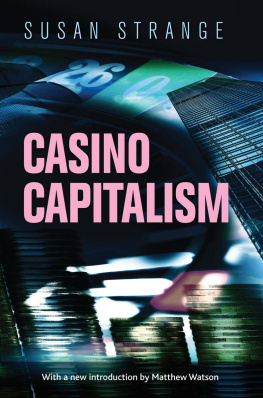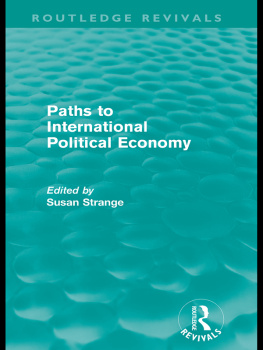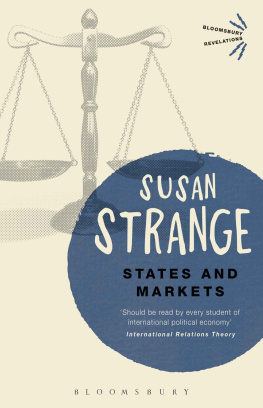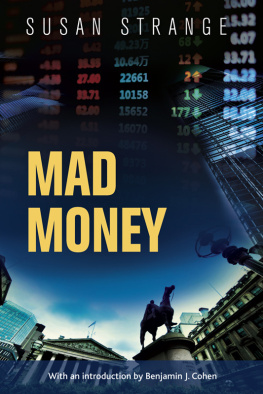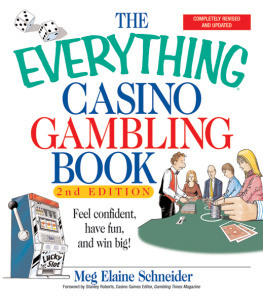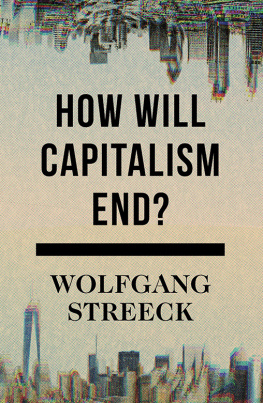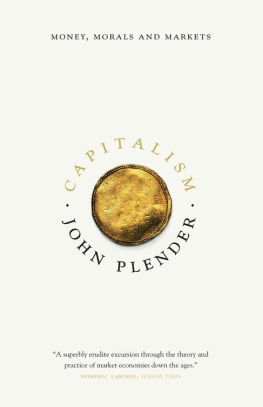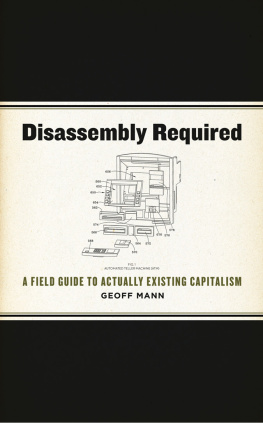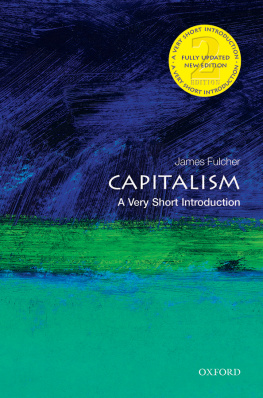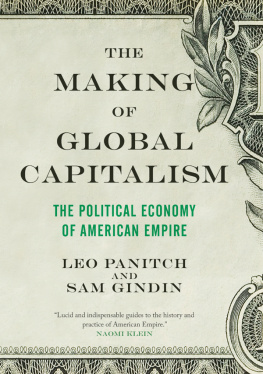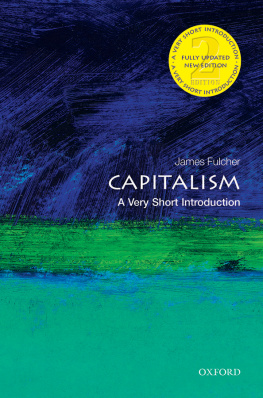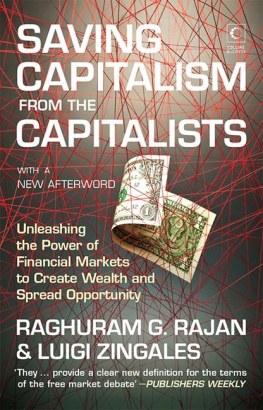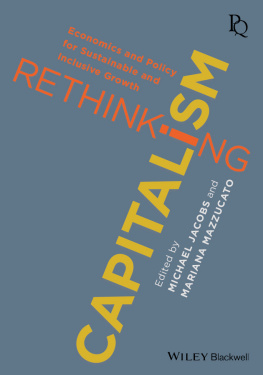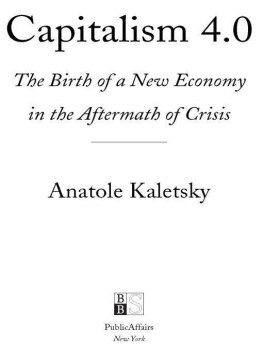
CASINO CAPITALISM

CASINO CAPITALISM
With a new introduction by Matthew Watson
Susan Strange
Manchester University Press
Copyright Susan Strange 1986, 1997
Copyright the estate of Susan Strange 2016
Introduction copyright Matthew Watson 2016
The right of Susan Strange to be identified as the author of this work has been asserted by her in accordance with the Copyright, Designs and Patents Act 1988.
First edition published 1986 by Basil Blackwell Ltd
First paperback edition published 1997 by Manchester University Press
This edition published 2016 by Manchester University Press
Altrincham Street, Manchester M1 7JA
www.manchesteruniversitypress.co.uk
British Library Cataloguing-in-Publication Data
A catalogue record for this book is available from the British Library
Library of Congress Cataloging-in-Publication Data applied for
ISBN 978 1 7849 92651
This edition first published 1997
The publisher has no responsibility for the persistence or accuracy of URLs for any external or third-party internet websites referred to in this book, and does not guarantee that any content on such websites is, or will remain, accurate or appropriate.
Typeset by
Servis Filmsetting, Stockport, Cheshire
List of figures and tables
Figures
Tables
Introduction
Matthew Watson
I did not know Susan Strange. We never met in person, and neither did we ever correspond. As I began to contemplate writing this Introduction, a thought struck me. I could not help but look back to a younger version of me, still fresh into my PhD programme, when Manchester University Press decided to republish Casino Capitalism for the first time in 1997. Would I have been brave enough back then, I wonder now, to have sought Susans counsel had I found that we were attending the same event? I hope that the answer would have been yes, but in all likelihood I would have believed that it was not my place to disturb her train of thought when in full flow.
Those thoughts, of course, have left a golden legacy for anyone engaged in the study of International Political Economy (IPE). It is by no means necessary to have crossed paths with Susan the person to have crossed the paths laid down by Strange the academic. Her journalists eye for distilling the zeitgeist into a single, memorable phrase, coupled with her ability to flesh out those phrases in richly suggestive academic terms, means that she continues to be an important presence within the IPE literature. Indeed, Benjamin Cohens () recent best-selling intellectual history of the field, in which Strange is positioned among the seven trailblazers who established its foundations, has ensured that her standing is currently more secure than ever.
Yet at the same time this remains primarily a background presence. Younger generations of IPE scholars are more likely to know of Stranges work as part of an overall summary of the field than they are to be familiar with its content. What, that old stuff? is a frequently rehearsed retort to the encouragement to become immersed in its finer details. And it is true that the first republication of Casino Capitalism contained a new Preface in which Strange observed that a fair sub-title for the book could well have been Some reflections of an amateur historian (p. xix). The history in question, though, refers to events that are commonly assumed to have been overtaken by bigger developments on which a maturing IPE has cast its gaze. Moreover, it is told entirely independently of both the theoretical and the methodological pursuits that have subsequently come into fashion. If Strange is to be viewed as a trailblazer, it is often said, then it is for a style of IPE for which the trail has gone cold.
This second republication of Casino Capitalism, this time alongside its companion volume, Mad Money, provides the ideal opportunity to set the record straight in this regard. For anyone who is returning to these books for the first time in a number of years, it is a delight to be reacquainted with the nuance of a historical perspective that emphasizes the significance of decisions that could have been taken but were not (pp. 2638) just as much as the decisions that were actually taken (pp. 3849). History thus comes alive as a highly politicized lens in Stranges hands through the analysis of alternatives that were available but were overlooked simply because they did not fit the prevailing political mentality. For anyone coming to this work for the first time, there will consequently by many moments of revelation. Even though a selfconsciously theoretical voice was so often written out of Stranges work, younger generations of IPE scholars will find on repeated occasions that her texts speak to them in a language that helps to confirm their own subsequent theoretical choices. Stranges amateur history thus pre-empts a good deal of IPEs future, in its concern for both the way in which the financial system was becoming a repository for political power and for how this made more and more people susceptible in their everyday lives to the whims of financial market pricing dynamics.
The casino metaphor
The advantages of having such a name allow us to say that we continue to live in Strange times whenever we recognize in Casino Capitalism a footprint into which we have later stepped. But the overriding message of the book is that we do indeed live in strange times in an altogether different meaning of the phrase. How did we ever get here?, the reader is asked to ponder when led through the steps which resulted in the dissolution of the Bretton Woods system of managed financial prices. There is always a sense, lying just beneath the surface of the text, that this particular piece of institutional vandalism was something that touched Strange personally. She had, after all, worked as a journalist in the United States covering the first five years operation of the Bretton Woods system in the ).
Unsurprisingly, then, it is not necessary to look too hard in Casino Capitalism for the outline of a narrative structure of heroes and villains (). This is the history of an embryonic financial globalization told through a reminder of the duties on behalf of their citizens that political elites had overlooked when once again handing financial pricing dynamics over to market mechanisms. The architects of the original Bretton Woods agreements are the most obvious heroes of the piece for having had the foresight to try to rule out by institutional means the future that eventually unfolded. They are joined by those who at the time of Stranges writing were positioning themselves as the spiritual heirs of the attempts at Bretton Woods to keep finance firmly reined in. The villains consist of the policy-makers mainly from the United States in Stranges telling who did most to sabotage the collective agreements for managing financial prices, the bankers who were able to project their private interests in alternative market-based arrangements as the new national interest, and the economists who popularized Panglossian preachings on all things market-related.
The cast list was thus drawn, but the participants still required a stage on which to act. This came in the form of the central metaphor around which the whole of the analysis is organized: that of the casino. It is an alluring metaphor, at first glance providing instinctive confirmation of so many of the ills of the modern economic condition, but on a second and third pass also revealing how much of contemporary significance relating to the internal operation of financial markets must remain unsaid when likening them directly to a casino. The greatest allure of the metaphor might ultimately be just how much
Next page
